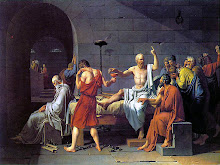
"To the angel of the church in Laodicea write:
These are the words of the Amen, the faithful and true witness, the ruler of God's creation. I know your deeds, that you are neither cold nor hot. I wish you were either one or the other! So, because you are lukewarm—neither hot nor cold—I am about to spit you out of my mouth. You say, 'I am rich; I have acquired wealth and do not need a thing.' But you do not realize that you are wretched, pitiful, poor, blind and naked. I counsel you to buy from me gold refined in the fire, so you can become rich; and white clothes to wear, so you can cover your shameful nakedness; and salve to put on your eyes, so you can see. Those whom I love I rebuke and discipline. So be earnest, and repent. Here I am! I stand at the door and knock. If anyone hears my voice and opens the door, I will come in and eat with him, and he with me. To him who overcomes, I will give the right to sit with me on my throne, just as I overcame and sat down with my Father on his throne. He who has an ear, let him hear what the Spirit says to the churches."
Revelation 3:14 – end.
Our reading is from the book of Revelation, or the book of Apocalypse as it is also known. It was written towards the end of the first century, and it’s title, ‘Apocalypsis’, means to reveal, or to uncover. But, revealing and uncovering its meaning is not as straightforward as translating this ancient Greek word.
Because revelation, according to tradition, was written inside a cave, written by someone exiled, as it says in the text, upon the island of Patmos, where I have just been on holiday.
- Of course, it was all for research purposes on your behalf, you understand. I like to be well prepared for blogged sermons but secretly I couldn’t wait to return. [I look forward to preaching on the letter to the Jamaicans.]
Patmos, as one of the Dodecanese islands, is picturesque and peaceful, and marketed as the Jerusalem of the Aegean. It is a reasonably large place, very hot and very sunny, extremely beautiful, and surrounded by a bright blue sea. And half way up one of its mountains and below the castle-like Monsatery of St John the Theologian, you can still find the Holy Cave of the Apocalypse, tourist attraction and world heritage site.
Inside, out of the hot sun, an Orthodox priest tells candle lighting crowds about its traditions, provided no photographs are taken. The icon sellers do a roaring trade, and there is no hint at all of paranoia or persecution.
Not so at the time of the writer 20 centuries ago, when Patmos was part of the Roman Empire in the province of Asia, apparently used by the Romans as a place to send the empire’s convicts. In Roman Asia the emperors themselves were hailed with public inscriptions describing them in glowing terms, as ‘Saviours’ ‘Benefactors’, and even ‘Sons of God’. Emperor Domitian is said to have
demanded worship as Lord and God.
And so the book of Revelation was written as a cryptic and coded re-reading of biblical tradition in the light of the death of Jesus.
Its writer, apparently stuck on Patmos, used his series of strange dreams and visions, perhaps to pose an ancient version of Monty Python’s famous question: “What have the Romans ever done for us?”
He was asking more than that, and certainly he was trying to reveal Jesus’ kind of rule as the truly immanent / imminent rule, whilst criticizing the worldy rule of the day by men such as the Emperor Nero, whom history depicted as a tyrant. Christians were to live differently.
But since then many people have interpreted Revelations strange symbols as predictions of the future, even of 21st Century geo-politics. Some of the more disturbing interpreters seem in hurry to try to force God’s hand and dispense with this world altogether.
Even putting them aside, please, there’s still no doubt that Revelations' message of a New Creation revealed by Christ has proved an enduring one right to the present day.
One children’s Bible puts it like this: “Its going to be alright,” John said, “God is making everything new again. He’s shown me his wonderful new world. One day, some day, we will all share it, God and his people together, as Jesus promised… Just as it was when the world began”.
Even the author of ‘Lady Chatterly’s lover’ DH Lawrence, who apparently referred to the book of Revelation as the “Judas Iscariot of the New Testament”, called his own dying work ‘Apocalypse’. In it, he offered his radical criticism of civilisation and his belief in a New Heaven and a New Earth.
Our reading highlights just one of a series of letters on this theme to churches of the day, the letter to the Church of Laodecia. 'He who has an ear, let him hear what the Spirit says', it ends.
But the literal Laodecia has long gone – any remains of it are now modern day Turkey. It was a very wealthy city indeed, well known for its banking, its textiles, and its medical school and eye medicine. Life was good in Laodecia. Empire and all.
This meant people thought they didn’t need anything more than their wealth and comfort. So, back on Patmos they were being perceivied as compromising themselves, and were described, as we have heard, as neither cold nor hot, but lukewarm—a condition which would cause God to ‘spit them out’
To put it another way, they would be putting themselves beyond God's reach by thinking and acting self sufficient. We are not Laodecians, but here may be the relevance of the letter to us today.
I don’t know if you have ever been to bathe in a volcanic hot spring, but there are several around the Dodecanese. The one I was in whilst on holiday, continuing the research, had piping hot underground water flowing up and out through a long channel carved into the foot of a cliff.
Let's imagine it. The water must be at least 60 degrees as it leaves the channel before opening into a warm waist high pool on the beach, like a giant Jacuzzi surrounded by rocks. Finally this hot water flows out through the rocks and into the cold waves of the sea.
It all smells of sulphur, but it isn’t at all hell. As the water flows from almost too hot to handle to too cold for comfort, what you notice is how most people crowd into the warm part in the middle, where things are just right, and just comfortable.
Out near the edges where it is either challengingly hot or bracingly cold, only a minority go. They live differently.
These few adventurers go into the cold and then back into the heat, using the place like a plunge pool of extremes. At one point someone even wedges his whole body tightly into the hot channel, and closes his eyes too see how long he can stand it.
A passer by thinks he is dead or dying, and starts prodding him.
But isn’t it possibly only these extreme experiences of our lives that are able to force us out of our comfort, and our complacency, our satisfaction and our self reliance, where purely material things are quite enough thank you, where religion, if there is any, is tame and stale, and where our true selves are very well hidden away from us, so that the apparently un-needed love of Christ can make little difference.
The Christians in Laodecia are so satisfied that God is no longer their concern. Their prosperity has blinded them to the need for a new creation - ironic in a city with an opthalmic hospital.
What already works for them is too important to them, and this is one definition of idolatry – our grasping onto something good and already created, as if it is as important as God, someone better, beyond, in other words, uncreated, transcendent, still coming, not this...
Can we cling to something good SO hard that we fail to accept something far better? A little like our friends in Laodecia, where the piped water was lukewarm, and apparently nauseous to drink, a metaphor for a self-sufficiency which doesn’t recognize any spiritual need, and for a church which won’t venture into risks.
Of course, only
we can really answer the question about whether this is us, but we should ask it. Because if we are each, as individuals and as a community, effectively insulated from death, conflict, failure, and guilt, all of which can point us beyond ourselves, then we may be sleepwalking into gaining the world and losing our lives.
Exchanging freedom in the One for security in something smaller.
Do we perhaps hide ourselves from any challenge, or from subtler, deeper reality? Do we care about what the originator of life might want us to be, and to do? If we comfort ourselves, as if our death is something which can be ignored and avoided, as if our questions can all be answered, and as if our suffering can simply be anaesthetized away along with our true selves, it is just possible that we may fail to co-operate with that otherness, that other energy and spirit here, Jesus Chris's energy, and spirit.
For all people, our temporary selves are not be enough in the end, and for this reason, despite being written in a very different era under a very different situation, the letter to the Church at Laodecia may speak to us still, should we wish to hear it now rather than at the end.
Or we could close the doors and be satisfied just the way things are, and go home for tea. The alternative is to listen to the challenge of scripture. Those whom I love, it says, I rebuke and discipline. Be earnest, and repent.
Here I am! I stand at the door and knock. If anyone hears my voice, and opens the door, I will come in and eat with him, and he with me.
What DOES this mean? To relate to God as if we were eating with him, and relate this way to others and to God in others. It means a relationship of I-Thou [as Jewish philosopher Martin Buber puts it] and not I-It. No-one is to be an object to be used, controlled, or overcome. Speaking to God, not about God. Speaking to one another, not about one another. Presentness, authenticity, responsiveness, related to an eternal Thou. This is a true
REVELATION, a revelation, not in predicting the future, but in living one out now, without any limits.
There is an analogy about learning to swim. Standing on the bottom will help up to a point, but if we try it in the deeper end, we drown. To be in Christ is to be freed from comforting, controllable, predictable limits.
























































































